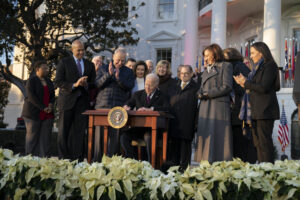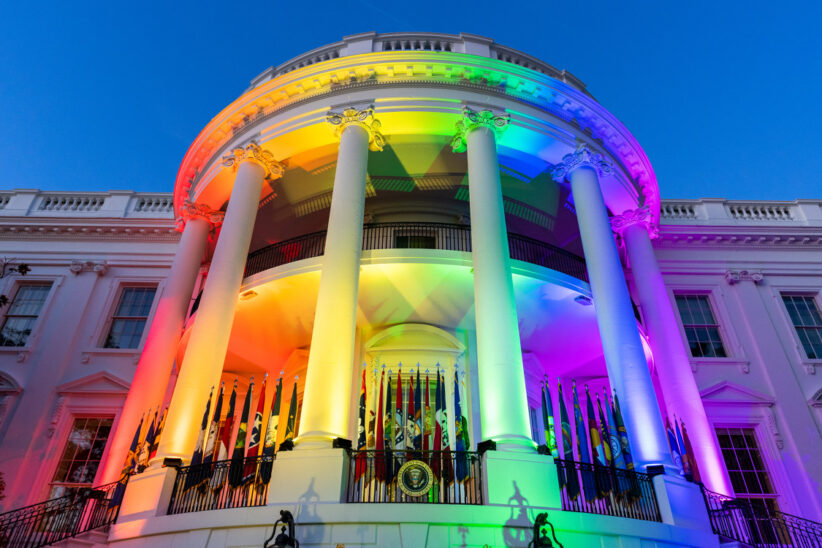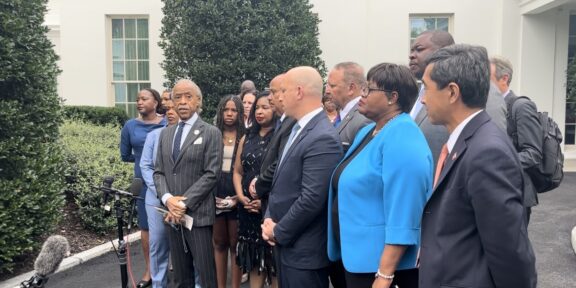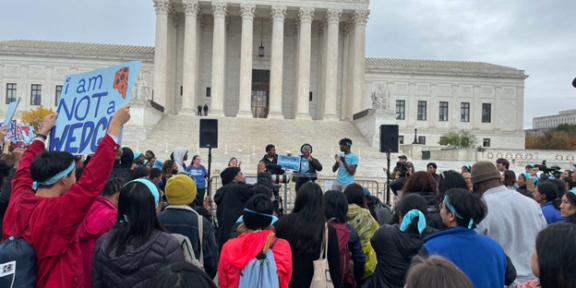By Julius Washington
Howard University News Service
President Biden signed into law today the Respect for Marriage Act during a ceremony at the White House, formally repealing the Clinton-era Defense of Marriage Act.
The bill, which passed both chambers with bipartisan support, will codify into law federal recognition of marriage between same-sex and interracial couples, as decided by the U.S. Supreme Court in Obergefell v. Hodges.
Biden, who made headlines in 2012 for publicly indicating his support before the White House had articulated such a position, called the passage of the legislation “a vital step towards equality, liberty and justice.”

Marriage is a simple proposition: Who do you love, and will you be loyal to that person you love? It’s not more complicated than that,” Biden said.
In 2013, the Supreme Court held in United States v. Windsor that same-sex couples were entitled to the same federal marriage rights and privileges as heterosexual couples, repealing Article 3 of DOMA. In 2015, the court’s decision in Obergefell v. Hodges repealed the rest of the law, holding that, “there is no lawful basis for a State to refuse to recognize a lawful same-sex marriage performed in another state on the ground of its same-sex character.”
Recent legal challenges, however, and an increasingly conservative Supreme Court raised fears that the court might overrule the decision and give states the ability to ban same-sex marriage.
Following the Supreme Court’s 6-3 decision in Dobbs v. Jackson Women’s Health Organization (2022) and Justice Clarence Thomas’ individual, concurring opinion, where he expressed the opinion that the Supreme Court had a “duty to correct” its “substantive due process precedents, including Griswold, Lawrence, and Obergefell,” Democrats in Congress introduced a number of bills to codify these decisions into federal law, on issues including contraception, private decisions about sexual behavior and same-sex marriage.
The bill passed both chambers of Congress with bipartisan support, 61-36 in the Senate and 258-169 in the House. An earlier version of the bill passed in the House in July with increased Republican support.
A religious liberty exemption was added to the bill to help garner support from some reluctant senators. Included in the exemption were guarantees that the tax-exempt status of churches could not be revoked and “confirms that non-profit religious organizations will not be required to provide any services, facilities, or goods for the solemnization or celebration of a marriage.’
House Speaker Nancy Pelosi and Majority Leader Chuck Schumer were on hand at the White House event and delivered remarks in commemoration of the historic legislation.
“For millions of LGBTQ Americans, today is a historic day, a day of jubilation, and a day of relief,” Schumer said. “After a lot of hard work, today, the long inexorable march towards greater equality takes an important step forward.”
Speaker Pelosi heralded the efforts of the attendees and activists in helping to make the bill’s passage a reality.
“This would not have happened without the advocacy, without the mobilization, at the grassroots level,” Pelosi told the assembled crowd. “You all made this happen.”
The event also featured performances from a pair of Grammy-nominated artists, including Sam Smith, who performed his hit song, “Stay With Me,” and Cyndi Lauper, who performed “True Colors.”
The Respect for Marriage Act also enshrines into law protections for interracial couples. While the 1967 decision in Loving v. Virginia was not explicitly mentioned as being targeted in Justice Thomas’ dissent, the decision relies on substantive due process, the same legal reasoning behind Griswold, Lawrence, and Obergefell.
Julius Washington is a reporter for HUNewsService.com, specializing in politics.
















